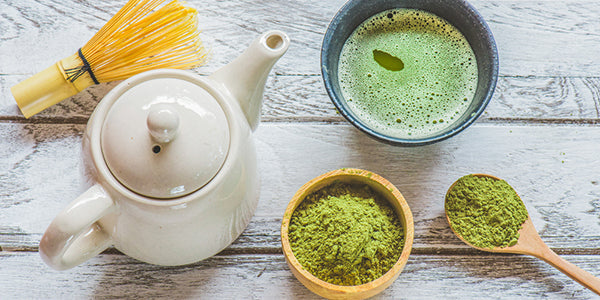
But, What's So Special About Adaptogens?
Also recognized as adaptogen herbs, adaptogens are non-toxic plants often marketed to defend against stressors of all kinds. They function by fighting cortisol, the body's primary stress hormone that works to control mood and motivation.
Too much cortisol can reap havoc on the entire body and lead to a number of health problems, including anxiety and depression, memory issues, insomnia, and weight gain. That being said, adaptogens are touted to reduce stress and anxiety, boost the immune system, increase energy, and promote weight loss.
Adaptogen herbs are often produced into adaptogen supplements, consumed as teas, and blended into smoothies, soups, and salad dressings. They come in various forms, including these seven super herbs that promote weight loss, fight stress, and increase energy.
7 Natural Herbs for Weight Loss, Energy, and Stress-Relief
1. Ashwagandha
Meaning "smell of a horse," ashwagandha bares a strong aroma and described as "horse-like." But its meaning also serves as a dual purpose, as its has been said its users gain the strength and stamina of a horse!
Ashwagandha is predominately used to manage a number of health conditions, including depression, anxiety, arthritis, insomnia, and diabetes. The adaptogen is also used in hopes to fight against aging, particularly by improving brain function and boosting memory.
2. Bacopa
Customarily used in Indian medicine, bacopa is often acquired to manage pain, anxiety, and overall stress.
Furthermore, there is sufficient evidence suggesting bacopa may be effective in the fight of Alzheimer's disease, as the plant could increase chemicals in the brain involved in memory and thinking.
3. Ginseng
Termed Asian, Chinese, Korean, or American, ginseng tends to take the name of its origin. But despite its birthplace, ginseng is rooted in alternative medicine!
There has been a heavy pool of evidence suggesting the various forms of ginseng are used to manage depression, anxiety, general and chronic fatigue. Ginseng may also improve mental function and protect against Alzheimer's disease and age-related memory loss.
4. Matcha
Literally meaning "powdered tea," matcha grew its hype as the sippable, green health elixir.
Whereas green tea tea leaves are routinely steeped into hot water then removed, matcha is the literal leaves finely crushed and blended into a solution. (So technically, you are actually drinking the tea leaves.)
And thanks to its potent antioxidants, matcha bares some noteworthy health benefits, including facilitation of fat loss, protection against heart disease, and regulation of blood sugars.
5. Tulsi
Touted as the "herb for all reasons" by the Journal of Ayurveda and Integrative Medicine, tulsi has shown to be successful in addressing physical and psychological health conditions.
The adaptogen herb shows to protect organs and tissues against chemical stress from pollutants and heavy metals and physical stress. It has also been found to manage blood glucose, pressure, and lipid levels, along with protecting against depression and problems associated to memory and cognition.
6. Rhodiola
Trademarked as "artic root," rhodiola is native to the arctic regions of Europe, Asia, and Alaska and has an extensive history as a medicinal plant in Iceland, Sweden, France, Russia, and Greece.
Rhodiola is most commonly used for increasing energy, endurance, strength, and mental capacity by helping the body acclimate to and resist physical, chemical, and environmental stressors.
7. Schisandra
Schisandra is often used to combat stress and increase energy, physical performance, and endurance. Furthermore, the adaptogen herb may prevent early aging and promote lifespan.
The adaptogen herb has also shown to be effective in improving liver function in individuals with hepatitis.
Are Adaptogen Herbs Considered Safe?
Being a plant, adaptogens are mostly considered to be safe. But before taking any sort of herb or supplement, you should always know exactly what you are consuming, as supplements are unregulated and may contain unwanted fillers.
Furthermore, as "adaptogen" is an umbrella term for multiple herbs, you should look at the specific properties of that specific herb you desire to use. A healthcare professional can further ensure its safety and guide you into the recommended dosage and potential side effects and interactions.
And not to mention, and while showing to be safe and potentially effective, adaptogens should not replace a balanced diet. Ultimately, use the adaptogen herbs in conjuction with whole grains, fruits and veggies, lean and plant-based proteins, and healthy fat sources for the upmost results!







